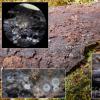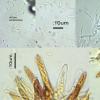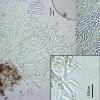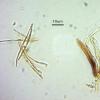
12-02-2026 21:34
patrice CallardBonjour, la face inférieure des feuilles ce certa

11-02-2026 22:15
 William Slosse
William Slosse
Today, February 11, 2026, we found the following R

12-02-2026 14:55
Thomas Læssøehttps://svampe.databasen.org/observations/10581810

11-02-2026 19:28
 Lothar Krieglsteiner
Lothar Krieglsteiner
on small deciduous twig on the ground in forest wi

25-04-2025 17:24
Stefan BlaserHi everybody, This collection was collected by J�

10-02-2026 17:42
 Bernard CLESSE
Bernard CLESSE
Bonjour à toutes et tous,Pourriez-vous me donner

10-02-2026 18:54
Erik Van DijkDoes anyone has an idea what fungus species this m

09-02-2026 20:10
 Lothar Krieglsteiner
Lothar Krieglsteiner
The first 6 tables show surely one species with 2

09-02-2026 14:46
Anna KlosGoedemiddag, Op donderdag 5 februari vonden we ti
Unguicularia?
Steve Clements,
27-04-2015 21:06
I used Fungi of Switzerland and W.G. Dennis (A Revision of the British Hyaloscyphacaea)in coming to a possible genus for this asco – with the very refractile hairs (FOS), and a lumen at the base only (Dennis) combined with urniform shape and minute size. However, I have read that the hairs of Unguicularia dissolve on heating in KOH solution – these didn't.
On very rotten wood – likely Fagus, in small groups. Sessile, urn-shaped, maximum 0.3mm diameter, 0.2mm height. Colour white. Surface minutely hairy. Spores 6-8 x 1.5-2 – maybe with polar guttules. Asci with croziers (some) about 40x5: reaction with Lugol: contents reddening, tip darkening rather than blueing. Hairs(?) highly refractile, irregular, with lumen at base, up to 5 wide, not dissolving on heating in 10% KOH. Paraphyses thread-like, about 1 micron wide.
I suspect this is a difficult fungus – any advice would be very welcome,
Kind regards,
Steve
Chris Yeates,
27-04-2015 21:37

Re : Unguicularia?
Hi Steve
I think I have sent you Raitviir's "Revised Synopsis of the Hyaloscyphaceae"? If not let me know . . . .
I think this will prove to be Olla millepunctata (= Unguicularia scrupulosa amongst other names). Compare with http://www.ascofrance.com/search_recolte/3993
cheers
Chris
I think I have sent you Raitviir's "Revised Synopsis of the Hyaloscyphaceae"? If not let me know . . . .
I think this will prove to be Olla millepunctata (= Unguicularia scrupulosa amongst other names). Compare with http://www.ascofrance.com/search_recolte/3993
cheers
Chris
Hans-Otto Baral,
27-04-2015 22:38

Re : Unguicularia?
The ascus base should be without croziers, actually. I prefer to separate scrupulosa for those on wood, with slightly wider asci and spores.
Steve Clements,
27-04-2015 23:37
Re : Unguicularia?
Many thanks Chris and Zotto,
yes - I wasn't too convinced about the croziers.
I have just spotted the Raitvir paper on my overcrowded desktop!
Cheers,
Steve
yes - I wasn't too convinced about the croziers.
I have just spotted the Raitvir paper on my overcrowded desktop!
Cheers,
Steve
Steve Clements,
28-04-2015 09:03
Re : Unguicularia?
Hi,
I have run my findings through the key for Olla in Raitviir, and apart from the details on excipular cells (which I found hard to differentiate in my squash preparation) my data is a good match for Olla millepunctata. I see that Congo Red and Meltzer's were used in Raitviir, as well as KOH.
Kind regards,
Steve
I have run my findings through the key for Olla in Raitviir, and apart from the details on excipular cells (which I found hard to differentiate in my squash preparation) my data is a good match for Olla millepunctata. I see that Congo Red and Meltzer's were used in Raitviir, as well as KOH.
Kind regards,
Steve



